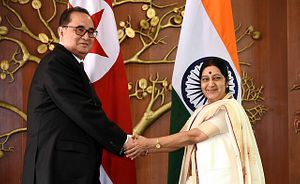On Monday, North Korea’s top diplomat, Ri Su-yong, arrived in India on a rare visit. Ri became the first North Korean foreign minister to visit India in at least 25 years (although Kim Yong-il, the North Korean vice foreign minister, visited India in 2007 and 2009). The last time a senior Indian official visited North Korea was over two decades ago, when Shankar Dayal Sharma, then the Indian vice president, met Kim Il-sung.
In New Delhi, Ri met with his counterpart, Indian External Affairs Minister Sushma Swaraj. According to reports, the two discussed North Korea’s nuclear weapons program and regional security issues, including the stability of the Korean peninsula.
In addition to Swaraj, Ri met with Indian Vice President Hamid Ansari. Ri’s trip to India comes ahead of Indian Prime Minister Narendra Modi’s scheduled visit to Seoul, South Korea, which is expected in May. Modi is currently on a tour of France, Germany, and Canada and thus was not in India when Ri arrived.
The specifics of Ri’s conversations with senior Indian officials remain unknown, but it is likely that Ri requested Indian aid and assistance. In 2011, India provided $1 million in emergency aid through the World Food Program. New Delhi will be keen to keep the details of the visit under wraps in order to avoid perceptions that India is contravening South Korean interests in assisting North Korea. Reports in the Indian media suggested that Ri would brief Indian officials about the status of North Korea’s nuclear weapons program, a source of concern for New Delhi. Swaraj reportedly conveyed Indian security concerns to Ri during his visit. She emphasized India’s position “on the importance of maintaining peace and stability on the Korean Peninsula, including the objective of denuclearizing.”
North Korea is under heavy international sanctions for its nuclear weapons program. Though India did not participate in the Six-Party Talks that disintegrated almost exactly six years ago, in 2009, New Delhi’s strategic relationships with both South Korea and Japan have grown considerably in the years since. New Delhi has not historically played the role of an intermediary actor between North Korea and its neighbors, but if Ri’s visit truly included a briefing on the North’s nuclear weapons program, it is likely that India could convey this information to other Northeast Asian states.
Ri’s visit to India additionally comes at a time when relations between China and North Korea are “on shaky ground,” as The Diplomat‘s Kerry Brown noted. Ri’s trip to India will not go unnoticed in Beijing. For New Delhi, which recently declared its intention to turn its decades-old “Look East” policy into an “Act East” policy, increasing its engagement with Pyongyang is, in many ways, both strategic and calculated.
India and North Korea maintain normal diplomatic relations, and bilateral trade between the two countries totals around $500 million annually.

































